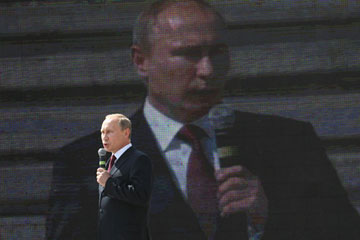
Russian President Vladimir Putin delivers a speech at the opening of the Barmaley Fountain on August 23, 2013 in Volgograd, Russia.
(2 of 7)
Now, after a year of deadlock on everything from human rights to nuclear nonproliferation, the U.S. and Russia are as much at odds as at any time since the Cold War. The confrontation will be on full display Sept. 5--6 as Putin hosts world leaders at the G-20 summit in St. Petersburg for talks on the Syria crisis and the halting global economic recovery. On Aug. 7, U.S. President Barack Obama canceled a meeting with Putin scheduled to precede the G-20 gathering: it was the first time a summit of the Russian and U.S. leaders had been called off in 53 years. Obama compared Putin's slouching posture at previous summits to that of a "bored kid in the back of a classroom." Putin's response: "President Obama hasn't been elected by the American public in order to be pleasant to Russia," he told the AP. "And your humble servant hasn't been elected by the people of Russia to be pleasant to someone either."
The proximate cause of the latest spat was Russia's decision to grant asylum to Edward Snowden, the whistle-blower who is wanted in the U.S. for leaking the secrets of American intelligence agencies. But the roots of Putin's confrontationalism are as much political and economic as they are personal and historical. Having faced Western creditors abroad and a disaffected population at home when he first took office in 2000, Putin has spent the past 15 months marrying his country's windfall profits from soaring oil and gas prices to a patriotic message of imperial rebirth. In an attempt to exorcise Russia's lingering humiliation over the Soviet collapse, he has plowed investment into military hardware and its bristling display from its borders in Europe to the economically vibrant Pacific Rim.
But Russia's rapid rebound has also revealed its limitations, which have left Putin in no position to offer a leadership alternative to the U.S. Russia still lacks the military or economic muscle to build a broad coalition of allies. States once bonded to Moscow by force or expediency have broken away in all directions--pushed as much by the centrifugal force of their ambitions as the arrogance of their onetime overlord. Corruption inside Russia is stuck at the level of a Third World kleptocracy, rendering the state so inefficient that Putin often has to intervene in the pettiest municipal affairs, such as unpaid wages at provincial factories or building-code violations. The nation that put the first man into space has given the world no distinctly Russian exports under Putin except for midshelf vodka and Kalashnikov assault rifles.
Instead of functioning democratic institutions, Russia today has Putin's brand of "manual control," a form of government based on Kremlin fiat and jerry-built solutions. Add to that the economy's dependence on the prices of oil and gas (they make up 45% of exports) and Russia's frailties are plain to see--even in the most stage-managed setting. On the square in Volgograd, Putin suggested a role in Russia's resurgence for the Night Wolves, whom he has held up as representatives of a new generation of patriots. "He told us to be proud of our past," says the biker gang's leader, Alexander Zoldastanov, who goes by the nickname Surgeon. But for all their patriotic bluster, even the Night Wolves have to import their bikes. The three-wheeler that Putin likes to ride at the front of their columns is a Harley-Davidson.
